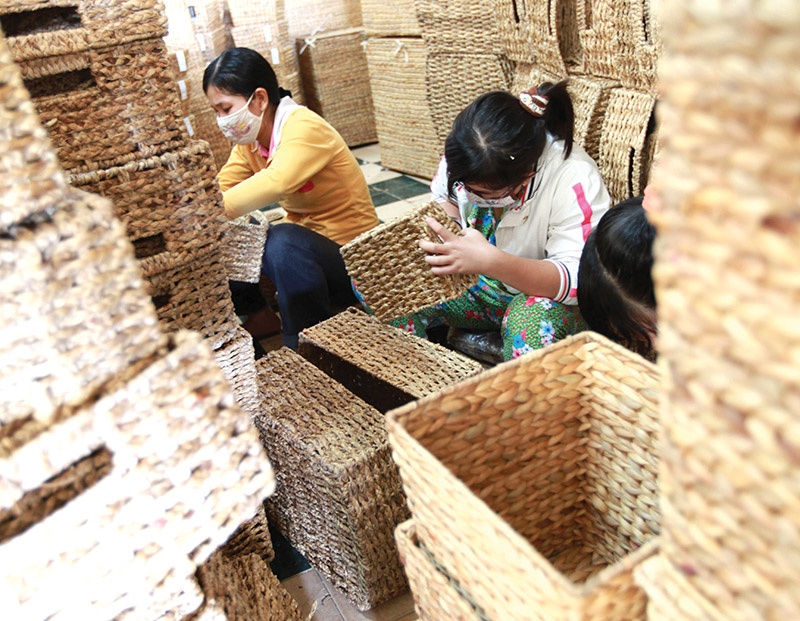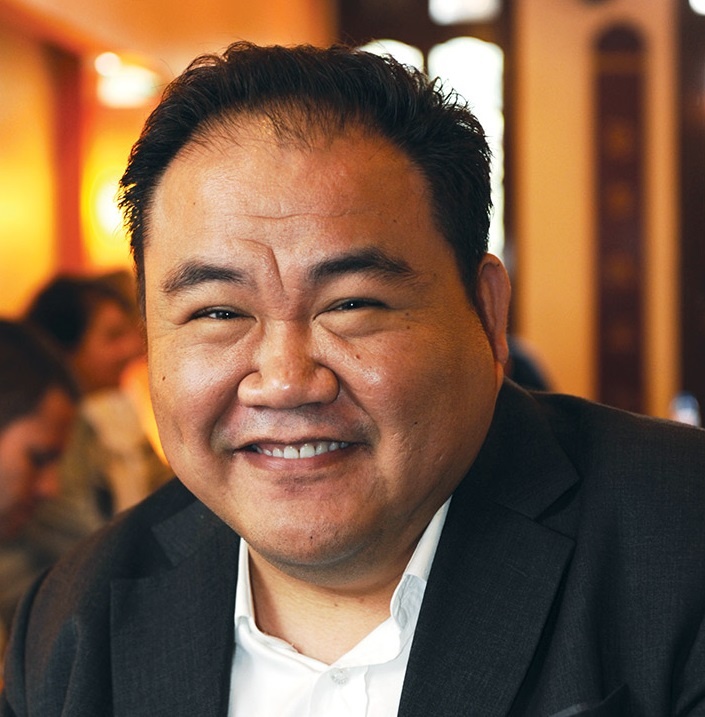INTERNATIONAL INVESTMENT
AND PORTAL
 A new government strategy will implement a more enabling environment for smaller businesses, photo Le Toan
A new government strategy will implement a more enabling environment for smaller businesses, photo Le Toan
The Economic and Social Commission for Asia and the Pacific (ESCAP), the most inclusive intergovernmental platform in the Asia-Pacific region, and the Inclusive Business Action Network (iBAN), a global initiative supporting the scaling and replication of inclusive business (IB) models, have proposed the Vietnamese government to find solutions to develop IBs, which they said can “play a strong role in supporting such structural transformation.”
“IB models promote inclusive growth by investing in innovative, commercially viable, and growing business models that provide, at scale, relevant and affordable goods and services, or enhanced livelihood opportunities, to people living at the base of the pyramid,” said the ESCAP and iBAN in their new joint report titled on inclusive companies in Vietnam. “These businesses promote social transformations as they have a large and deep social impact. Inclusive businesses bring triple wins for companies, the poor, and for Vietnamese society.”
IBs refer to those providing goods, services, and livelihoods on a commercially viable basis to people living at the base of the pyramid, making them part of the value chain of companies as suppliers, distributors, retailers, or customers.
According to the Ministry of Labour, Invalids and Social Affairs’ latest statistics, by late 2021, Vietnam had more than 609,000 poor households or 2.23 per cent of the country’s population, and over 850,000 near-poor households or 3.11 per cent.
Impactful highlightsThe consultant team initially identified 160 companies with potential IB business models, shortlisted 60 for further assessment, interviewed 43, rated 40 and found nine real and 10 potential IB cases.
These 19 IBs include Bio King, Bobi Craft, Dakoda, East-West Seed, Green Gen, Hamona, HTC, My Lam, Quang Vinh Ceramics, and Sao Thai Duong, among others operating across the country.
They expect strong revenue growth from $130.2 million in 2018 to $205.5 million in 2023, up 65 per cent within only five years, or 13 per cent annually. Based on these growth projections, most companies will develop medium to large IB line businesses.
While the number of IB firms identified in this landscape study is relatively small, their social impact is quite large. The 19 IB benefited in 2018 about 2.6 million people in 632,000 households. Given the companies’ growth projections, social reach is also expected to substantially increase by 26 per cent in five years. By 2023, it is expected that the 19 IB models will benefit 3.5 million people. The success of promoting IB should be assessed based on the social impact that these companies bring, rather than on their revenue or the number of companies with IB models.
In a specific case, established in 2011 in Ho Chi Minh City, Bobi Craft produces and exports branded premium hand crochet children’s toys and accessories using top quality material in Vietnam. All Bobi Craft products are manufactured in line with the EN71 standard, the set of safety requirements for toys sold in the EU.
In 2018, the company worked with more than 400 producers – of whom 98 per cent are women – in the southern province of Ba Ria-Vung Tau, the central Highlands city of Dalat, and Ho Chi Minh City, including disabled persons, farmers with free time, and women at home.
That year, Bobi Craft achieved a revenue of about $2.17 million, about 20 per cent more than in 2016, and by 2023, the company expects sales in the amount of $2.6 million. The gross profit margin is about 25 per cent, higher than the sector average.
Bobi Craft also supports disadvantaged people through a monthly allowance paid in addition to a salary of $13-22. On average, a full-time producer can earn a monthly salary between $260-430, plus overtime payment, as well as social and health insurance (for the employees only, not the suppliers). Combined salary and overtime payment could reach $870 per month in total. The salary is paid based on the number of working hours and products.
To achieve further growth, Bobi Craft plans to expand export markets and to invest in new technology, designs, materials and products. The company follows high environmental and social safeguard standards, adopting a zero-waste policy, enhancing the recycling of materials, and using no chemicals in production. Until now, Bobi Craft had not borrowed from banks but rather from family members.
In another case, in 2016, Dakado in the Central Highlands province of Dak Lak introduced an intercropping model of avocado with pepper to increase the income for the farmers. With some modifications to increase its social impact, this business line could qualify as IB.
In 2018, Dakado’s revenues reached $2.17 million, doubling the revenues over the past three years. It expects to reach a revenue of $4.34 million in 2023. Eighty per cent of the revenues come from the potential IB business line (avocado and pepper intercropping). Profits from avocado are 10-20 per cent, while they are only 1-2 per cent for pepper. The net profits of the company are about 5 per cent.
The company reinvested – together with the farmer groups – in new varieties of higher productivity. From 300 households in 2016, Dakado is now working with around 1,000 households (300 intercropping avocados and peppers, 500 avocadoes, and 200 macadamias), and it is planning to double the number of contract farmers and upscale social reach to 2,000 farmers by 2023. About 60-70 per cent of the farmers are women, and 90 per cent are from poor or low-income households.
Dakado provided the farmers with seeds, fertilisers, a demonstration farm, and technical training on safe production.
Lack of supportIn October 2019, Vietnam’s prime minister issued Decision No.1362/QD-TTg approving the Sustainable Private Sector Development Strategy and tasked the Ministry of Planning and Investment to design an implementation plan. Decision 1362 aims to boost the development of sustainable private sector businesses through 2025, with a vision to 2030.
The strategy aims to support an enabling environment, develop competitive and sustainable businesses, and support small- and medium-sized enterprises. Specific objectives of the strategy include increasing the innovation capabilities of firms, increasing the income of employees and firms’ contribution to the state budget. IBs, however, are not explicitly mentioned in Decision 1362.
“The promotion of IBs will require the active participation of business associations. Business associations can play a catalytic role in promoting IBs by getting engaged in IB accreditation, helping with IB advocacy and information, and supporting business coaching with stronger sustainability objectives,” suggested ESCAP. “It is recommended that the government establishes a business coaching facility to support accredited potential IB companies to transform their business into IB or set up a separate IB business line.”
ESCAP and iBAN said Vietnam’s government can support its national strategic economic and social goals of promoting innovation and inclusive growth and development by promoting enabling environments for inclusive business to emerge and develop. “IB companies can play a catalytic role in the government’s objective of encouraging the private sector to become more dynamic and productive and supportive of economic growth and low-income groups,” they said.
Tieu Quoc Dat - Vice director and co-founder Think Playgrounds

Think Playgrounds is a rather special social enterprise, which gathers people who are always creative and make endless efforts to bring interesting and useful public playgrounds for children in the city.
With the mission of reclaiming and protecting public spaces for children, I think we are doing well in our mission in Hanoi and some provinces across the country, solving typical problems of children in modern society including lack of communication space, play time, or lack of motivation to exercise and be creative.
In addition, we also step by step change parents’ perception of the role of games in the education and development of children, which is extremely important. During seven years of dedicated efforts, we have created more child-friendly public spaces in Hanoi, especially in densely populated residential areas.
It is a big challenge to survive for a small business like Think Playgrounds. We have to ensure both legal obligations and social responsibilities, so we always have to redouble our efforts, especially in the context of the complicated pandemic and the negative effects of geopolitical issues.
Therefore, tax support as well as preferential policies for social enterprises should be a priority because it will become a stepping stone for businesses to support disadvantaged groups and urgent problems in society.
Jimmy Pham - Founder and CEO KOTO

KOTO is recognised as the first social enterprise in Vietnam operating as a non-profit, charitable, and humanitarian organisation, providing at-risk and disadvantaged youth with an intensive 24-month programme of vocational hospitality training.
KOTO graduates receive an internationally recognised accreditation from Box Hill Institute (Melbourne, Australia) and go on to have careers in leading hotels, resorts, and restaurants in Vietnam and the world.
In addition to vocational training and life skills, we cooperate with Apollo English Centre to provide English-language learning. After finishing the course, we look for jobs in hotels and restaurants and accompany them to develop their careers.
After more than 22 years of operation, KOTO has built a fairly reputable and reliable brand in Vietnam and around the world. We have trained and created stable jobs for more than 1,200 children.
Also, as a social enterprise, we want to change the industry’s mindset about street children. Many people still think that street children are lazy and social evils, but they can become useful and responsible people that make contributions to their families and society.
Like many other social enterprises, we also face difficulties as not many people understand the social enterprise model. Although Vietnam has now recognised social enterprises, the government has issued several mechanisms and policies that have yet to remove difficulties for businesses because there is still a lack of an adequate legal framework for social enterprises to operate. Thus, social enterprises do not have tax and insurance incentives, and have difficulty in accessing loans and grants.
Another difficulty comes from financial sources, especially in the past two years. Due to the pandemic, we lost our revenue and became very passive. Currently, KOTO's training centre moved into a smaller space in Viet Hung street, Hanoi.
We also had to close a restaurant in Van Mieu street, which previously mainly served tourists and contributed more than 70 per cent to KOTO’s revenue. The new restaurant has been moved to Tay Ho, serving Vietnamese and foreigners living and working in Vietnam.



















